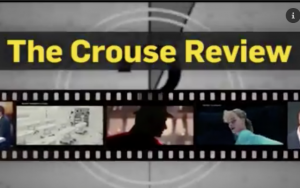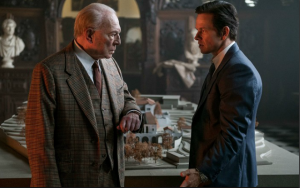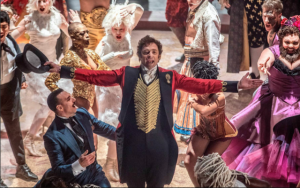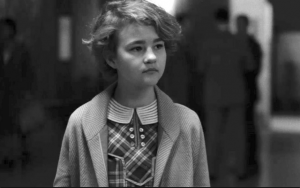RICHARD’S WEEKEND MOVIE REVIEWS FROM CP24! FRIDAY DECEMBER 29, 2017.
 Richard and CP24 anchor Nathan Downer have a look at the weekend’s new movies including “All the Money in the World” and “Molly’s Game.”
Richard and CP24 anchor Nathan Downer have a look at the weekend’s new movies including “All the Money in the World” and “Molly’s Game.”
Watch the whole thing HERE!
 Richard and CP24 anchor Nathan Downer have a look at the weekend’s new movies including “All the Money in the World” and “Molly’s Game.”
Richard and CP24 anchor Nathan Downer have a look at the weekend’s new movies including “All the Money in the World” and “Molly’s Game.”
Watch the whole thing HERE!
 Richard sits in with CTV NewsChannel anchor Beverly Thomson to have a look at “All the Money in the World” and “Molly’s Game.”
Richard sits in with CTV NewsChannel anchor Beverly Thomson to have a look at “All the Money in the World” and “Molly’s Game.”
Watch the whole thing HERE!
 A weekly feature from from ctvnews.ca! The Crouse Review is a quick, hot take on the weekend’s biggest movies! This week Richard looks at “Downsizing,” “I, Tonya” and “The Greatest Showman.”
A weekly feature from from ctvnews.ca! The Crouse Review is a quick, hot take on the weekend’s biggest movies! This week Richard looks at “Downsizing,” “I, Tonya” and “The Greatest Showman.”
Watch the whole thing HERE!
 “All the Money in the World,” a new true crime drama from director Ridley Scott, unwittingly became a talking point in the #MeToo conversation when disgraced star Kevin Spacey was disappeared from the film, replaced by Christopher Plummer. The ripped-from-the-headlines tale of ageing oil tycoon J. Paul Getty’s refusal to pay any ransom after his grandson’s kidnapping made headlines itself for the eleventh hour recasting. Question is, was the all the trouble worth it?
“All the Money in the World,” a new true crime drama from director Ridley Scott, unwittingly became a talking point in the #MeToo conversation when disgraced star Kevin Spacey was disappeared from the film, replaced by Christopher Plummer. The ripped-from-the-headlines tale of ageing oil tycoon J. Paul Getty’s refusal to pay any ransom after his grandson’s kidnapping made headlines itself for the eleventh hour recasting. Question is, was the all the trouble worth it?
Set in 1975, the film begins with a pulse racing sequence that sees sixteen-year-old John Paul Getty III (Charlie Plummer, no relation to his co-star) plucked from the streets of Rome and thrown into a van by the Communist Red Brigade kidnapping gang lead by Cinquanta (Romain Duris). The family patriarch, tetchy tightwad J. Paul Getty (Christopher Plummer), denies the Calabrian mob’s demand for a $17 million ransom, in part because he suspects his grandson may have had a role in planning his own abduction and, more importantly, because he feels he’ll become an ATM machine (although they didn’t exist yet) for every kidnapper brave enough to scoop up one of his 14 grandkids. “My Gramps wasn’t just the richest man in the world,” explains Getty III, “he was the richest man in the history of the world.”
Months later the stakes are raised all round when Getty III’s severed ear shows up in the mail. As former CIA agent Fletcher Chase (Mark Wahlberg) investigates—“Bring him back as quickly and inexpensively as you can,” he is told.—the young Getty’s mother, Gail Harris (Michelle Williams) appeals to Getty senior’s better nature.
Based on the book “Painfully Rich: The Outrageous Fortunes and Misfortunes of the Heirs of J. Paul Getty” by John Pearson, “All the Money in the World” is a handsomely made, if not terribly deep, thriller. Scott can stage an action scene and build tension but the real star here is Plummer. As “the old one with the money” he hands in the second example this year after “the Man Who Invented Christmas” as to why he was perhaps born to play Ebenezer Scrooge. The sensational aspect of the casting aside, he hands in a performance that is one part doddering grandpa, one part cold-blooded shark. When he says, “There’s very little in life worth paying full price for,” in reference to his grandson it sounds like something your grandfather might have said. When he refuses to pay the ransom until he realizes it could be a tax deduction, it sends a chill down the spine.
Wahlberg doesn’t fare as well. He may be the film’s biggest star but he’s miscast as the calculating ex-CIA agent. Williams is better, all compassion and determination.
By the end credits it’s obvious that “All the Money in the World” isn’t simply a real life crime story but a timely gaze into the lives of the super rich. “We look like you,” says Getty III, “but we are not like you.”
 If Wolverine had been around in the 1840s P.T. Barnum would have made him a star. As “The Greatest Showman” tells us, the inventor of the modern circus sought out “unique persons and curiosities” to build a show that lasted for 143 years. After nine movies as the cigar-smoking X-Man Hugh Jackman now dons the ringmaster’s trademarked top hat to tell the tale of an American institution.
If Wolverine had been around in the 1840s P.T. Barnum would have made him a star. As “The Greatest Showman” tells us, the inventor of the modern circus sought out “unique persons and curiosities” to build a show that lasted for 143 years. After nine movies as the cigar-smoking X-Man Hugh Jackman now dons the ringmaster’s trademarked top hat to tell the tale of an American institution.
We first meet the future impresario as the young son of an impoverished tailor. When he makes the daughter of one of his father’s rich patrons laugh, it is love at first sight. Cut to a song or two and many years later, Barnum (now played by Jackman) is grown up with a head full of dreams, a houseful of children and a happy marriage to his childhood sweetheart Charity (Michelle Williams). What he doesn’t have is a viable career.
Fired from a job as an accountant, he packs up his desk, taking his ledger, pens and a packet of worthless deeds to sunken ships. Using those certificates he secures a $10,000 loan to start his first business, The Barnum Museum, complete with wax sculptures, stuffed animals and a thief-turned-magician named O’Malley. “People are fascinated by the exotic and the macabre,” he says.
He has trouble selling tickets until his daughters make a suggestion. “You need something sensational,” they say, “like a mermaid or unicorn. Something alive, not stuffed.” He doesn’t round up any mermaids or unicorns but does assemble a bearded lady (Keala Settle), trapeze artists (Zendaya and Yahya Abdul-Mateen II), tattooed men, Dog-faced boys, Irish giants (Radu Spinghel) and Siamese twins.
Critic James Gordon Bennett (Paul Sparks), denounces the show as exploitation. “It’s a circus,” he raves. “The word you used to describe my show has a nice ring to it,” says Barnum and the concept of the contemporary circus was born.
Money poured in but respect did not. “My father was treated like dirt,” says the so-called “purveyor of the obscene and indecent.” “I was treated like dirt. My daughters won’t be treated like dirt.” In an attempt to court a more upscale crowd he brings on socialite and actor Phillip Carlyle (Zac Efron). Carlyle, when he isn’t pining for acrobat Anne Wheeler (Zendaya), sets up shows for Queen Victoria and introduces Barnum to opera singer Jenny Lind (Rebecca Ferguson). Dubbed the Swedish Nightingale, she is the biggest singing star in Europe, and Barnum almost goes bankrupt trying to make her a sensation in America.
It isn’t until he rediscovers his roots—and the virtues of performing under a tent—that he makes a lasting impression.
“The Greatest Showman” is a period piece but pulsates with the rhythms of contemporary music. Songwriters Benj Pasek and Justin Paul, who took home as Oscar last year for their work on “La La Land,” provide a timeless score that rings with the brassiness of present-day Broadway. It feels slightly strange, although no more strange than people suddenly bursting into song while traipsing down the street. The songs are catchy and the loose-limbed contemporary choreography would likely have caused riots in 1845.
As the flamboyant huckster who craves legitimacy Jackman returns to his musical theatre roots, handing in a performance that wouldn’t be out of place on the Broadway stage. The flimsy-ish story doesn’t give him much opportunity to really dig deep into what made Barnum tick. The genial actor, however, in a bigger-than-life performance, brings the rags to riches tale if not to vivid life, at last to tuneful life.
More interesting is the film’s subtext. It’s an American success story writ large but beyond that are comments on equality and bigorty. Despite advertising his menagerie of performers as a freak show we’re told Barnum saw his circus as a celebration of humanity in all its forms. The movie favours uplift and inspiration over deep insight, but its harmonious pop psychology will make your feet tap.
The message of tolerance is central to the plot, reinforced by the Carlyle, Wheeler romance. The upper crust actor and the African American acrobat are drawn to one another despite societal the norms of the day. When his father scolds him, reminding him to remember his place he snaps back, “If this is my place I don’t want it.” As Barnum reaches for the gold, turning his back on his family and ‘freaks,’ Carlyle walks away from his privilege, following his heart.
With that in mind it’s a shame that the move doesn’t give its marginal characters more of a voice. The Bearded Lady, the Dog Faced Boy and others are more or less treated on film as Barnum treated them in life, as set dressing and not much more.
“The Greatest Showman” seems to have taken its lead from its subject and delivered a movie in which every number is a showstopper. It’s a rollercoaster of story and music that occasionally moves too fast but delivers enough thrills along the way to be worth the price of admission. Maybe that’s enough. As Barnum himself said, “The noblest art is that of making others happy.”
 A weekly feature from from ctvnews.ca! The Crouse Review is a quick, hot take on the weekend’s biggest movies! This week Richard looks at the Matt Damon film “Suburbicon,” the dreamy “Wonderstruck” and one of the year’s best films, “The Florida Project.”
A weekly feature from from ctvnews.ca! The Crouse Review is a quick, hot take on the weekend’s biggest movies! This week Richard looks at the Matt Damon film “Suburbicon,” the dreamy “Wonderstruck” and one of the year’s best films, “The Florida Project.”
Watch the whole thing HERE!
 Richard and CP24 anchor Jamie Gutfreund have a look at the weekend’s new movies including the Matt Damon film “Suburbicon,” the dreamy “Wonderstruck” and one of the year’s best films, “The Florida Project.”
Richard and CP24 anchor Jamie Gutfreund have a look at the weekend’s new movies including the Matt Damon film “Suburbicon,” the dreamy “Wonderstruck” and one of the year’s best films, “The Florida Project.”
Watch the whole thing HERE!
 Richard sits in with CTV NewsChannel anchor Marcia MacMillan to have a look at the Matt Damon film “Suburbicon,” the dreamy “Wonderstruck” and one of the year’s best films, “The Florida Project.”
Richard sits in with CTV NewsChannel anchor Marcia MacMillan to have a look at the Matt Damon film “Suburbicon,” the dreamy “Wonderstruck” and one of the year’s best films, “The Florida Project.”
Watch the whole thing HERE!
 The new film from “Far From Heaven” director Todd Haynes is show-me-don’t-tell-me cinema that comes close to being a sublime time at the movies but falls just short.
The new film from “Far From Heaven” director Todd Haynes is show-me-don’t-tell-me cinema that comes close to being a sublime time at the movies but falls just short.
Based on children’s novel written and illustrated by Brian Selznick, “Wonderstruck” weaves together two separate but related stories.
Ben’s (Oakes Fegley) story takes place in 1977. He’s a preteen living with his aunt in Minnesota following the death of his mother in a car accident. He’s unhappy, missing his mom and eager to reconnect with a father he never knew. Rummaging through his mother’s stuff he finds clues about his father’s whereabouts in New York City just before a lightening strike renders him deaf in both ears. Despite not being able to hear he runs away to the big city.
Meanwhile Rose’s (Millicent Simmonds) tale takes place fifty years earlier. It’s 1927 and the little girl, deaf since birth, is living with her father, a stern New Jersey businessman. Obsessed with film and stage star Lillian Mayhew (Julianne Moore) she sets off to New York City to meet her idol. There’s more to Rose’s story, but no spoilers here.
Up until this point Haynes uses every ounce of artistry in his considerable arsenal to bring these stories to life. New York, both in the 20s and 70s, is presented in vivid detail. Both stories are told with a minimum of dialogue—show-me-don’t-tell-me—with Rose’s time on screen mimicking a silent movie while Ben’s is more impressionistic, creating a vibrant portrait of NYC’s chaotic 1970s street life.
The film works best when Haynes let’s the pictures do the work. For much of its running time “Wonderstruck” plays like a dream, when it gets down to brass tacks—tying up the story threads—it disappoints, allowing reality to crash the party. What begins as a beautifully crafted flight of fancy grounds itself with a thud in the final half hour with a series of incredulous coincidences.